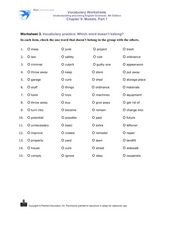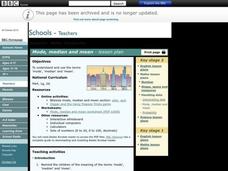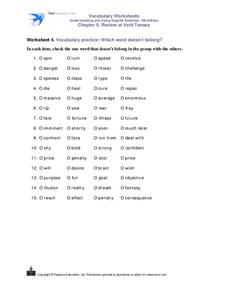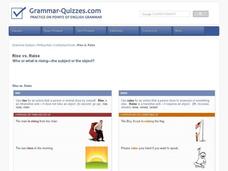Road to Grammar
Confusing Words
You bathe in a bath, and you might advise someone by giving advice, but how do you tell the difference between these commonly misused words? This page provides 10 sets of words that sound or look similar, but have different meanings....
Curated OER
Spanish-English Cognates in the ELL Classroom: Friends or Foes?
Define the meaning of a cognate and use the concept to help Spanish-speaking ELLs connect their first language to English. Middle schoolers explore Latin roots to find cognates in both languages. They relate the Spanish and English word...
Curated OER
Understanding and Using Root Words to Expand Vocabulary
Middle schoolers engage in a lesson plan which reminds them that root words indicate the base meaning of a word, and that those roots are found in many different words that have similar meanings. Pairs of pupils use construction paper...
Math Wire
SnowDaySnowDaySnowDaySnowDay...
How many times can you cheer about a snow day before you get to the 100th letter? Find out with a creative word problem that challenges young mathematicians to determine what the 100th letter will be in a sequence of letters.
Curated OER
Troublesome Word Pairs
This instructional activity helps to understand when to use commonly confused words. It includes definitions, writing exercises, and questions that require paraphrasing the meaning of sentences. A good exercise for middle schoolers, or...
Curated OER
Easily Confused Words: Precede and Proceed
So many words are easily confused in the English language. Take precede and proceed, for example. Look at the example sentences provided here, and then have your learners take the short quiz. Have they mastered these vocabulary terms?
Curated OER
Choose Your Words Wisely
Improve word choice! Writers use dictionaries and thesauruses to aid them in choosing exciting words to incorporate in their writing. They rewrite sentences and practice identifying words that can be replaced using a better word. Flip...
K12 Reader
Choose the Correct Homophone
It's a known secret that English can be a difficult language to learn, and homophones don't make it any easier. Help your young readers tackle these tricky words with this simple fill-in-the blank exercise in which they identify the word...
Curated OER
Word Pairs
Students compare similar words that are often confused. For this Language arts lesson, students review meanings of words that are often confused. Students complete a worksheet and sentences to practice correct usage of these words.
Read Theory
Analogies 2 (Level 7)
Determining the relationships between words is the purpose of this analogy instructional activity. Learners puzzle through 10 different analogies by using bridge sentences and types to determine which pairs of words share the same...
Read Theory
Analogies 3 (Level 7)
Master word analogies with a straightforward exercise. Pupils match word pairs to one another based on the relationships represented in each pair. The worksheet provides bridge sentences that learners fill out as they determine the...
Read Theory
Analogies 1 (Level 6)
Get your middle schoolers up to scratch with analogies using this worksheet. Pupils complete 10 analogies by determining the associations between the words and using the provided bridge sentences.
Read Theory
Analogies 2 (Level 6)
Activate analogy skills with a straightforward exercise. Learners complete 10 analogies, using the bridge sentences provided as support while they determine word relationships.
Read Theory
Analogies 1 (Level 7)
Analogies are a great tool for teaching word relationships. For this activity, learners complete 10 analogies using the bridge sentences provided to help them make the correct connections.
Curated OER
Which Word Doesn't Belong?
In this which word doesn't belong worksheet students read groups of words. In this multiple choice worksheet, students find ten answers.
Read Theory
Analogies 3 (Level 6)
Positive and negative may be opposites, but what does that have to do with the words clean and filthy? Ask your pupils to consider word relationships as they complete the 10 analogies presented here. Note that the exercise gradually...
Curated OER
Worksheet 5. Vocabulary Practice
In this vocabulary worksheet, students choose the correct word from the options in parenthesis that completes the sentence. There are 20 sentences to complete on this worksheet.
Curated OER
Mode, Median, and Mean
Young scholars define mode, median and mean, and perform mathematical operations to determine these 3 terms. In this statistics/math lesson plan, students practice memory strategies to help distinguish between mode, median, and mean....
Curated OER
Similarity
Students engage in a lesson that is concerned with the concept of similarity. This takes higher order thinking skills and being able to separate into categories. Specifically in this lesson they are introduced to the scale and how it is...
Curated OER
Vocabulary Practice: Which Word Doesn’t Belong?
In this vocabulary skills worksheet, students examine 15 sets of 4 words each. Students determine which words do not belong in the sets with the others that share similar meanings.
Curated OER
Confusing Words: Rise and Raise
In this confusing words: rise and raise worksheet, students read the explanations and examples for correct usage of these two words, then interactively complete 10 sentences for practice with immediate online feedback.
Curated OER
A Nice Story
Explore word choice in writing. Your class listens to a short story entitled "A Nice Day" (included) and discusses how the story could be improved. Pupils replace the word nice throughout the story with various synonyms, then reread the...
Curriculum Corner
Coniferous and Deciduous Trees
What are the differences between coniferous and deciduous trees? Supplement your tree lessons with a set of activities that has learners describing, naming, comparing, and reading about deciduous and coniferous trees. The activities are...
Curated OER
Vocabulary practice: Similar Meanings
In this vocabulary practice worksheet, students examine 12 sets of 3 words each and then add 1 word to each list that is a synonym to the others. A word bank is provided.

























